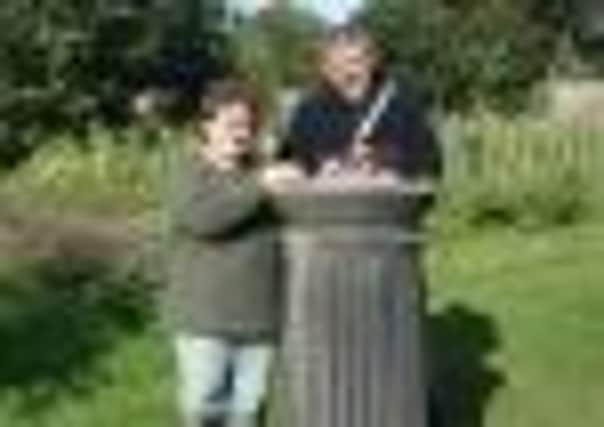Vegetable purity for vegans


The old walled garden at Forcett Hall north west of Richmond is a lovely spot. The house is a grade I listed and dates from 1740 when the style of the Italian architect Antonio Palladio was all the rage among the English aristocracy.
But when Katrina Palmer, and her partner Steve Barker arrived to take over the old walled garden at the hall it was in something of a state.
Advertisement
Hide AdAdvertisement
Hide Ad“It was derelict for 20 or 30 years before I came,” says Katrina. “Somebody had already made a start but he couldn’t carry it on.
“It belongs to the hall, it would have been their traditional garden. It had fallen into disuse so it was a hell of a mess when we first came here, it was all over the place.”
Her partner Steve is vegan. That means that what he eats is entirely animal free. So for example he eats no dairy food. “ It’s also known as ‘stock-free’ because there’s no input from stock,” says Steve.
“Basically, manure is excluded, as well as things like blood and bone-meal, by-products of animals.”
Advertisement
Hide AdAdvertisement
Hide AdThis is not a dietary principle followed Katrina, who eats meat and says, “It’s the logic of vegan things that they don’t want to exploit animals in any sense. So if you used an animal product you’re still part of the system that’s exploiting animals.”
The couple’s Bluebell Organics is one of a handful of gardens in the country which are certified as stock-free - a designation drawn up by the Vegan Organic Network together with The Soil Association.
Amanda Baker from the vegan network says that more growers are coming aboard.
“Numbers are growing quite well.
“There are 24 around the world registered as stock-free and 19 are in the UK.
Advertisement
Hide AdAdvertisement
Hide Ad“A lot of farmers are suffering from the high prices of the inputs they need to buy for their farms and one of the great things about stock-free organic farming is that you are very self reliant.”
Katrina and Steve say this is because growing without animal inputs just means replacing fertilisers such as manure with green-compost.
“Things like legume crops (beans and peas) will fix nitrogen,” says Steve.
“Or clover which probably covers about a quarter of the whole area, at any one time. That is planted two years in succession, so you’ve got one year, and then it’s taken out after the second year.
Advertisement
Hide AdAdvertisement
Hide Ad“You cut it and leave it, mince it up into a mush. We’ve got a petrol-driven shredder and everything goes through that to break it down.
“That’s the initial stage and then we leave it to break down further.
Take sweetcorn for example. When it’s finished you’re left with a great big plant. So it’s chopped into tiny bits, otherwise it would be left for a long time before it breaks down.” The bits of the plants which aren’t eaten – such as the tops from the beetroot – also go back into the land. And so does veg that hasn’t sold at the farmers’ markets Bluebell attends.
Steve concedes the concept of vegetables for vegans seems to have caught the imagination and interest of more people abroad than over here.
Advertisement
Hide AdAdvertisement
Hide AdThe idea has probably progressed furthest in Canada where they have coined the term `veganic’.
“There’s a lot of Canadian people who find us on the web and want to talk about things,” says Steve.
“In fact there was a vegan chef in Toronto who wants to come and learn about how to grow the things here.”
Katrina admits there is persuasive work still to be done on their part to convince potential customers.
Advertisement
Hide AdAdvertisement
Hide Ad“We haven’t yet had that many people who come to the stall and buy the vegetables because they are vegans. We’ve had one or two people who have recognised the stock-free symbol, and asked about it. “I think the majority of our customers come because it’s organic.
“At the Kilnsey show, there were people who wouldn’t normally buy organic, but because it was from Yorkshire and it’s a reasonable price they go for it. “They’re not people who are desperately interested in organic, but they want to buy Yorkshire produce.”
www.bluebellorganics.co.uk
What vegans will eat...
Donald Watson invented the term vegan in 1944 and was co-founder of the Vegan Society. Vegans do not agree with the idea that animals should be considered as commodities.
Vegetarians do not eat meat, fish, or poultry. Vegans, in addition to that, do not use other animal products and by-products such as eggs, dairy products, honey, leather, fur, silk, wool, cosmetics, and soaps derived from animal products.
Vegans eat dishes such tofu (bean curd) and tempeh, a soy product originally from Indonesia as well as seitan known as ‘wheat meat’ traditionally popular Far East cuisines.